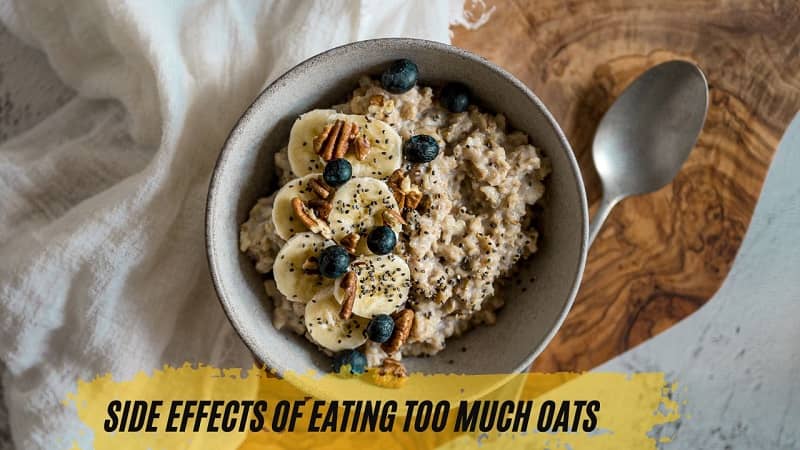Do eating too much oats leads to harmful side effects? Read here to know…
Oats are often touted as a superfood because they contain high levels of fiber, protein, and other nutrients. But is eating oatmeal every day bad for you?
Since oats are a great source of fiber, it provides several vitamins and minerals.
Also, Oatmeals are rich in iron, potassium, magnesium, zinc, vitamin B6, folate, thiamin, niacin, riboflavin, pantothenic acid, copper, phosphorus, manganese, and selenium.
Nevertheless, consuming too much of them may lead to unpleasant side effects. These include diabetes, bloating, and eating too much oatmeal cause weight gain as well.
Here’s a list of some of the possible side effects that one may face after consuming excessive oats.
5 Possible Side Effects of Eating too Much Oats
No doubt, oats are healthy foods, which is why almost everyone prefers them for breakfast. But taking it excessively is not the right way, and may elevate a number of health issues.
Here are five side effects of overeating oats.
#1: Bloating
Oats are healthy and delicious. Most people enjoy eating oats for breakfast as a nutritious meal.
But some of them don’t know that eating too much oats can cause bloating. Overconsumption of fiber in a person’s diet may cause bloating.
Along with fiber, oats contain starch and glucose. These nutrients are consumed by bacteria present in the large intestine, which causes bloating and gas.
#2: Can Lead to Malnutrition
If you’re eating too many oats, you might be missing out on other important nutrients.
While oats are a good source of fiber and some vitamins and minerals, they don’t provide all the nutrients your body needs.
Overeating oats can lead to malnutrition, which is a condition that occurs when your body doesn’t get enough of the nutrients it requires. Symptoms of malnutrition include fatigue, weakness, and weight loss.
#3: Eating too Much Oatmeal Can Cause Weight Gain
Most people think of oatmeal as a healthy food. Along with having a lot of fiber, it is healthy and nutrient-rich. However, eating too much oatmeal can sometimes cause weight gain.
The problem is that oatmeal is very high in carbohydrates. One cup of cooked oatmeal contains 28 grams of carbs, which is more than most people should eat in one meal.
When you eat too many carbs, your body turns them into sugar, which can lead to weight gain.
So, if you’re trying to lose weight or maintain your weight, be sure to limit your oatmeal intake.
And, if you do eat oatmeal, be sure to balance it out with protein and healthy fats to help slow down the sugar rush.
#4: Lead to Muscle Mass Shedding
Oatmeal is a popular breakfast, but it is important to remember that it is still a starch.
Studies say that overconsumption of starch may risk losing muscle mass.
Losing calories is good, but shedding muscle mass can have a serious health impact. Henceforth, try to consume it in a way to get its benefits unless its downsides.
#5: Oatmeal Side Effects on Skin
There has been a link between overeating oatmeal and skin infection. According to a study, it may lead to the risk of developing a skin infection.
This is because oatmeal contains a high amount of starch, which can act as a food source for bacteria.
When these bacteria grow on the skin, they can cause an infection. You should consult a professional for eliminating the cause of skin infection.
#6: Spike in Sugar
Last but not least, eating too much oatmeal can increase your sugar levels. This is because oatmeal is high in carbohydrates, which the body breaks down into sugar.
Also, it can also lead to weight gain, as the body stores excess sugar as fat.
If you have diabetes or are at risk of developing diabetes, it is important to track your sugar intake.
Overeating of oatmeal can cause your blood sugar levels to spike, which can be dangerous.
So, is eating oatmeal everyday bad for you? Here’s what I came to know after comparing the pros and cons of eating oatmeal.
Is Eating Oatmeal Every Day Bad for You?
Oatmeal is a healthy breakfast option, but you may wonder if eating it every day is bad for you.
The answer is no if you’re consuming it in an appropriate way. Oatmeal is a nutritious food that can help you lose weight, lower your cholesterol, and regulate your blood sugar levels.
However, it’s best to eat it moderately, as with all foods.
Excess consumption of oatmeal can cause weight gain, bloating, and constipation. So, enjoy your oatmeal, but don’t go overboard.
Well, the overall conclusion of the side effects of eating too much oats is, Yes, they may harm you.
But consuming them in an appropriate manner can help you to claim their benefits by neglecting the underlying effects.
Also, wanna know more about overnight oats?
Read this: Are overnight oats safe?
Conclusion
Whole grains, such as oatmeal, provide nutrients such as fiber, protein, and vitamins.
It is also relatively low in calories. However, if you eat too much oatmeal, you may start to see some negative effects on your body.
There are a few potential side effects of eating too many oats.
First, oats are high in fiber, which can lead to gastrointestinal issues like bloating, gas, and diarrhea. Constipation can also result from overeating fiber.
Second, oats contain phytic acid, which can bind to minerals like iron and zinc and prevent their absorption. As a result, these minerals may be deficient.
Finally, oats contain a protein called avenin, which can cause an immune reaction in some people. This can lead to symptoms like hives, itchiness, and swelling.
Furthermore, it is noticed, eating too much oatmeal cause weight gain.
That doesn’t mean you should put a full stop on oatmeal. It’s efficient, but only someone is having it in a calculated way.
Gulping anything excessively can have negative effects on your health.
